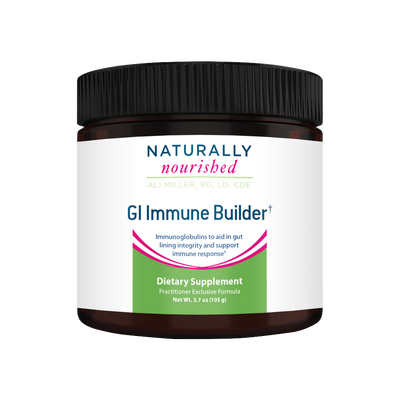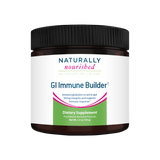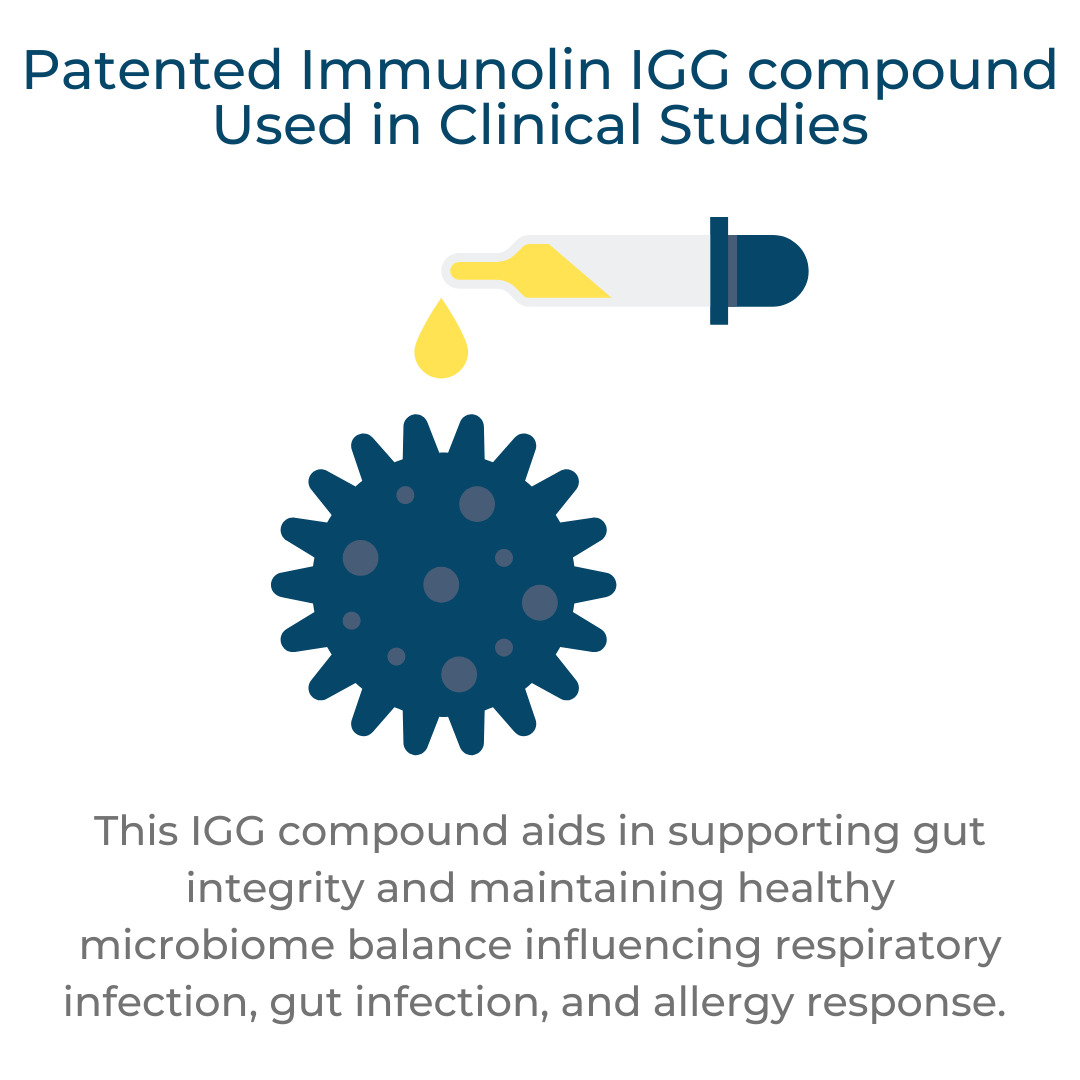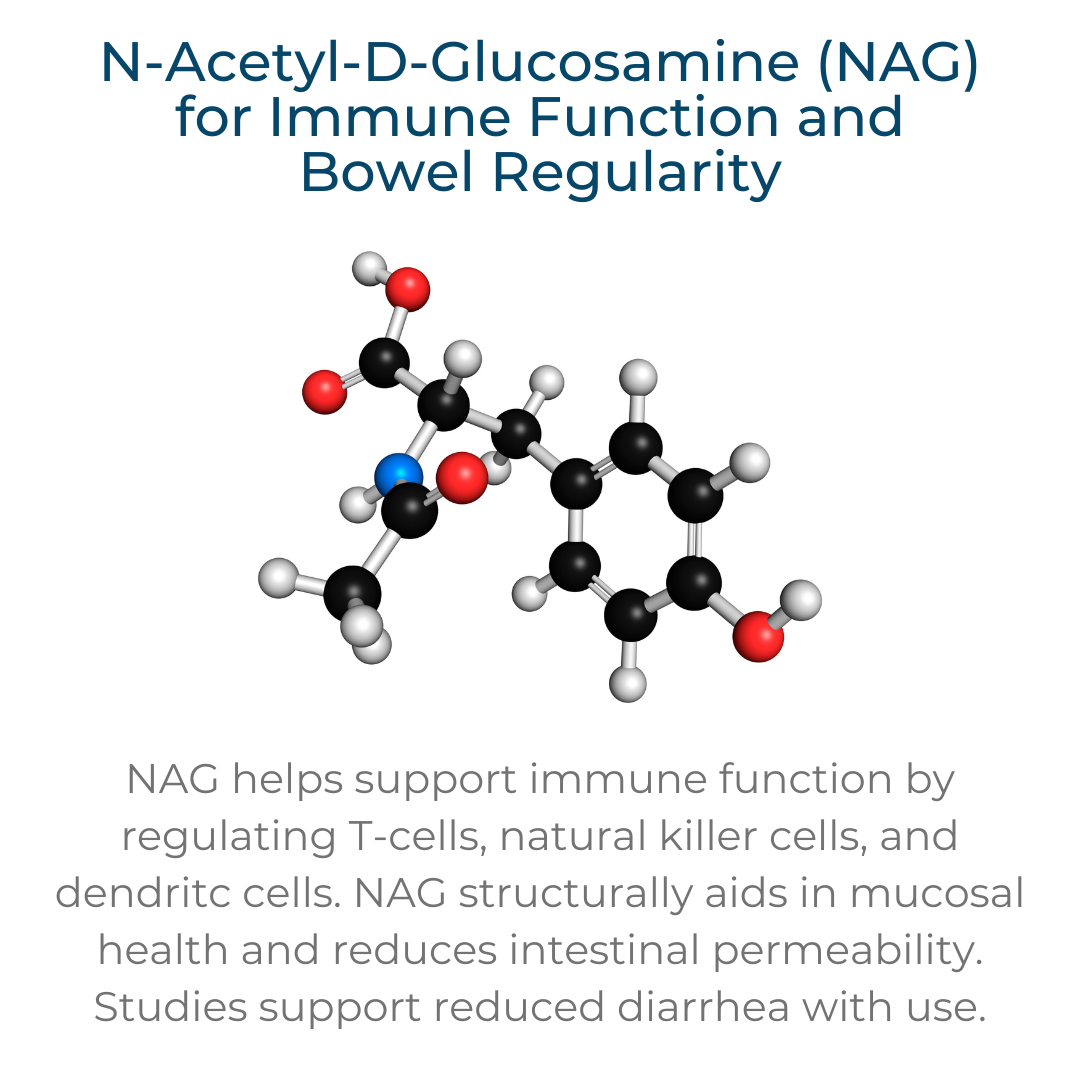









GI Immune Builder
3.7 oz, approx. 30 1 scoop servings
An easy to use powder to support structure and integrity of the intestinal lining and healthy immune response
Benefits of GI Immune Builder
- Supports gut lining integrity and structure
- Aids in digestive function
- Promotes a healthy mucosal immune system
- Regulates inflammatory response
- May aid in IBS and IBD
- May support reduction of food sensitivities
How to Take
Mix 1 scoop in 2-6oz liquid or 1-2 Tbsp nut butter, yogurt, or apple sauce
For Children during illness: Add ½ scoop to 1 Bio-C Plus Capsule and 1 Cellular Antiox Capsule with 2 tsp raw honey
For infants and babies: Mix ½ scoop into bottle of breastmilk or formula
Subscription & Use Tip
Contains 30 scoops which lasts 1 month with typical use
Safety
- Safe with breastfeeding
- Safe during pregnancy
-
Safe for Kids
Learn more
This product also supports
Digestion and Gut Health Immune and Wellness Inflammation & Brain
What Makes GI Immune Builder Superior?
We ensure all our products have the most bioavailable form of ingredients and combine different compounds to get the most powerful effects.
Description
GI Immune Builder provides immunoglobulins to prime the gut in response to bacteria, virus, and aid in reducing reactivity to foods. This product works hand in hand with GI Lining Support which supports gut lining integrity, whereas the GI Immune Builder ensures the gut has the tools to respond to any foreign invaders appropriately.
GI Immune Builder combines serum derived bovine immunoglobulin concentrate with IgG (ImmunoLin®) with N-acetyl-D-glucosamine to support the structure of the cells of the intestinal lining and promote a healthy inflammatory response in the cells of the gastrointestinal (GI) tract. These ingredients work together to provide support to the intestinal barrier and gut immune health. It is a proprietary, protein-based dietary supplement containing more than 50% immunoglobulins to help support digestive function and promote a healthy GI immune system.*
* These statements have not been evaluated by the Food and Drug Administration. This product is not intended to diagnose, treat, cure or prevent any disease.
Why Naturally Nourished
-
Potency
-
Clinical Results
-
Synergistic Formulas
-
Third Party Tested
-
Purity
Benefits
Highlights of GI Immune Builder:
- 2.5 g of ImmunoLin® SBI per serving to support gut health and promote a healthy gut immune system
- 1.1 g of IgG per serving from ImmunoLin® to support a normal immune response
- 1 g of N-acetyl-D-glucosamine per serving to support normal immune function and gut health
- Dairy-free formula
How to Use
Mix 1 scoop in 2-6oz liquid or 1-2 Tbsp nut butter, yogurt, or apple sauce
For Children during illness: Add ½ scoop to 1 Bio-C Plus Capsule and 1 Cellular Antiox Capsule with 2 tsp raw honey
For infants and babies: Mix ½ scoop into bottle of breastmilk or formula
Q&A
How is this product different than GI Lining Support?
This product contains immunoglobulins which play a key role in the body's immune system. They are proteins produced by specific immune cells called plasma cells in response to bacteria, viruses, and other microorganisms as well as exposures to other substances that are recognized by the body as "non-self" harmful antigens.
Research

GI Immune Builder contains immunoglobulins that have the potential to bind with a wide array of pathogens and foreign antigens. Antigens bound to immunoglobulins become larger, making it more difficult to pass through and create an immune response. This process does not adversely affect the commensal bacteria in the gut microbiota, supporting a healthy gut microbiome. It also promotes a regulated inflammatory response.
ImmunoLin® (SBI concentrate) is a proprietary, protein-based dietary supplement containing more than 50% immunoglobulins to help support digestive function and promote a healthy mucosal immune system.
SBI may support a normal immune response in the gut by binding to potential microbial antigens. This binding may be in pathogen-associated molecular patterns (PAMPs) or it may be to microbe-associated molecular patterns (MAMPs). When innate immune cells recognize PAMPs, inflammatory pathways, such as nuclear factor kappa B (NF-κB) are activated. Continual PAMP binding may contribute to chronic inflammation and associated disorders, including irritable bowel syndrome (IBS), inflammatory bowel disease (IBD), and human immunodeficiency virus (HIV)related enteropathy.(1,2, 3)
Microbial antigens, such as lipopolysaccharides (LPS), may activate an immune response, especially if they can cross through the epithelium.(2)
The immunoglobulins in SBI have the potential to bind with a wide array of pathogens and foreign antigens. Antigens bound to SBI become larger, making it more difficult to pass through and create an immune response. This process does not adversely affect the commensal bacteria in the gut microbiota, supporting a healthy gut microbiome. It also promotes a healthy inflammatory response. (1,2,3)
SBI also supports gut barrier function and mucosal health. (1) Inflammation in the intestinal mucosa may impact the structure and function of the intestinal cells, which may contribute to increased mucosal permeability.(3) Reducing this inflammation may help support gut barrier function and mucosal health.(4)
One co-culture model study assessed the efficacy of SBI in binding with common intestinal antigens and the effects on downstream immune responses, including interleukin-8 and tumor necrosis factor alpha (TNFα) cytokine production. The researchers used LPS, lipid A (hydrophobic antigenic head of LPS), and Pam3CSK4 (a synthetic TLR2 stimulator that mimics the N-terminal region of lipopeptides found in gram positive and gram negative bacteria) as an example of common antigens associated with GI tract inflammation. There was a dose-dependent response to SBI that bound the free antigens and inhibited cytokine production.(2)
Studies have demonstrated that SBI may promote mucosal and systemic immune response to infections and reduce markers of GI inflammatory conditions, such as IBS, ulcerative colitis, and HIV-related enteropathy.(1,3)
In an animal model of chemotherapy (irinotecan)induced gastrointestinal mucositis, 250 mg/kg or 500 mg/kg SBI twice daily were given for 4 days prior to irinotecan and for 6 days after. This led to a decrease in overall incidence, severity, and duration of diarrhea and clinical symptoms of mucositis. The animals who were given SBI also had fewer pronounced changes to neutrophil and lymphocyte levels after irinotecan with less damage to the colon and jejunum tissue. There was also less reduction of body weight compared to the control group.(5)
Another animal model demonstrated that SBI intake attenuated clinical signs of LF82/dextran sodium sulfate-induced colitis, including histological lesion scores and cytokine levels.(6)
In a mouse study with MDR la-/- mice (mice that spontaneously develop colitis), SBI supplementation led to a significant reduction in neutrophil recruitment and activation, and associated inflammation compared to the control diet, which had additional milk added. It also promoted an increase in regulatory Th cells, which helped increase transforming growth factor beta secretion to support a healthy inflammatory response.(7)
One study compared taking 5 g or 10 g of SBI per day or a placebo for 6 weeks in 30 patients diagnosed with IBS diarrhea predominant (IBS-D). Those in the 10 g group experienced a statistically significant within group improvement, including a reduction in abdominal pain, loose stools, bloating, flatulence, urgency, and any symptoms compared to baseline. The group taking 5 g per day had statistically significant within group improvement including a reduction in days with flatulence, incomplete evacuation, and any symptom.(8)
Another study on 15 patients with IBS-D evaluated the effects of participants taking 5 g of SBI twice daily for 8 weeks. The results demonstrated a reduction in number of stools per day, ease of passage, and evacuation. There was also an improvement in the diversity and makeup of the gut microbiota.(9)
Another study surveyed patients with IBS or IBD who were prescribed SBI. The researchers found that the percentage of those with IBS who had normal stool frequency increased from 35% to 91% after using SBI with a similar improvement in patients with IBD.10 The mean daily stool number decreased from 6.5 to 2.6 after SBI use.(10)
In a study on IBD patients, researchers compared controlling symptoms with 5 g daily of SBI or nutritional support. The results indicated clinical improvements in symptoms scores with SBI were 2.8 times more likely to occur. There were 49% of the patients who reported a response to SBI therapy at week 1 and 76% who reported a response at week 12. (11)
In a multi-center, double-blind, placebo controlled trial, researchers tested taking either 2.5 g or 5 g of SBI twice daily for 4 weeks versus a placebo in patients with HIV who had chronic idiopathic diarrhea. There were significantly improved health status scores in the SBI cohorts and a reduction in the severity of diarrhea and other GI symptoms, although it was not statistically significant compared to the placebo, which was dextrose.(12 )
N-Acetyl-D-Glucosamine (NAG) helps support immune function and mucosal health.
N-Acetyl-D-Glucosamine (NAG) helps support immune function and mucosal health and reduces intestinal permeability. NAG supports immune function and promotes a healthy inflammatory response by potentially reducing the excess activation of T-cells, natural killer cells, and dendritic cells.(13)
It enhances N-glycan branching, which inhibits T-cell activity, including Th1 and Th17 responses. In one mouse study, oral NAG inhibited myelin oligodendrocyte glycoprotein-induced experimental autoimmune encephalomyelitis and the secretion of inflammatory cytokines, including TNF-a, interferon-gamma, interleukin (IL)-17, and IL-22.14 The NAG was consumed by taking supplements in the drinking water at 0.25 mg/mL, with the average consumption around 4.5 mL to 5 mL of water. (14)
Studies have also demonstrated the potential for NAG to support the release of acid mucopolysaccharides by fibroblasts and help restore the protective structures in the GI tract.15 It may also help to restore the integrity and function of the mucous membrane.15 This may help support GI conditions such as IBD.(15,16)
In one study, 34 participants with IBD took 2 g of NAG three times per day for 4 weeks. The study results indicated an improvement in self-reported IBD symptoms, including abdominal pain, diarrhea, the passage of mucus, nausea, and rectal bleeding.(17)
REFERENCES
- Petschow BW, Burnett B, Shaw AL, Weaver EM, Klein GL. Serum-derived bovine immunoglobulin/protein isolate: postulated mechanism of action for management of enteropathy. Clin Exp Gastroenterol. 2014;7:181-190.doi:10.2147/CEG.S62823.
- Detzel CJ, Horgan A, Henderson AL, et al. Bovine immunoglobulin/protein isolate binds pro-inflammatory bacterial compounds and prevents immune activation in an intestinal co-culture model. PLoS One. 2015;10(4):e0120278. doi:10.1371/journal.pone.0120278.
- Petschow BW, Blikslager AT, Weaver EM, et al. Bovine immunoglobulin protein isolates for the nutritional management of enteropathy. World J Gastroenterol. 2014;20(33):11713-11726. doi:10.3748/wjg.v20.i33.11713.
- Petschow BW, Burnett BP, Shaw AL, Weaver EM, Klein GL. Dietary requirement for serum-derived bovine immunoglobulins in the clinical management of patients with enteropathy. Dig Dis Sci. 2015;60(1):13-23. doi:10.1007/s10620-014-3322-0.
- Bateman E, Weaver E, Klein G, et al. Serum-derived bovine immunoglobulin/protein isolate in the alleviation of chemotherapy-induced mucositis. Support Care Cancer. 2016;24(1):377-385. doi:10.1007/s00520-015-2806-6.
- Henderson AL, Brand MW, Darling RJ, et al. Attenuation of colitis by serum-derived bovine immunoglobulin/protein isolate in a defined microbiota mouse model. Dig Dis Sci. 2015;60(11):3293-3303. doi:10.1007/s10620-015-3726-5.
- Pérez-Bosque A, Miró L, Maijó M, et al. Oral serum-derived bovine immunoglobulin/protein isolate has immunomodulatory effects on the colon of mice that spontaneously develop colitis. PLoS One. 2016;11(5):e0154823. doi:10.1371/journal.pone.0154823.
- Wilson D, Evans M, Weaver E, Shaw AL, Klein GL. Evaluation of serum-derived bovine immunoglobulin protein isolate in subjects with diarrhea-predominant irritable bowel syndrome. Clin Med Insights Gastroenterol. 2013;6:49-60. doi:10.4137/CGast.S13200.
- Valentin N, Camilleri M, Carlson P, et al. Potential mechanisms of effects of serum-derived bovine immunoglobulin/ protein isolate therapy in patients with diarrhea-predominant irritable bowel syndrome. Physiol Rep. 2017;5(5):e13170. doi:10.14814/phy2.13170.
- Shaw AL, Tomanelli A, Bradshaw TP, Petschow BW, Burnett BP. Impact of serum-derived bovine immunoglobulin/ protein isolate therapy on irritable bowel syndrome and inflammatory bowel disease: a survey of patient perspective. Patient Prefer Adherence. 2017;11:1001-1007. doi:10.2147/PPA.S134792.
- Shafran I, Burgunder P, Wei D, Young HE, Klein G, Burnett BP. Management of inflammatory bowel disease with oral serum-derived bovine immunoglobulin. Therap Adv Gastroenterol. 2015;8(6):331-339. doi:10.1177/1756283X15593693.
- Asmuth DM, Hinkle JE, LaMarca A, et al. Evaluation of oral serum-derived bovine immunoglobulins in HIV-infected patients with chronic idiopathic diarrhea. HIV Clin Trials. 2017;18(5-6):205-213. doi:10.1080/15284336.2017.1401256.
- Richter J, Capková K, Hříbalová V, et al. Collagen-induced arthritis: severity and immune response attenuation using multivalent N-acetyl glucosamine. Clin Exp Immunol. 2014;177(1):121-133. doi:10.1111/cei.12313.
- Grigorian A, Araujo L, Naidu NN, Place DJ, Choudhury B, Demetriou M. N-acetylglucosamine inhibits T-helper 1 (Th1)/ T-helper 17 (Th17) cell responses and treats experimental autoimmune encephalomyelitis. J Biol Chem. 2011;286(46):40133-40141. doi:10.1074/jbc.M111.277814.
- Chen JK, Shen CR, Liu CL. N-acetylglucosamine: production and applications. Mar Drugs. 2010;8(9):2493-2516. doi:10.3390/md8092493.
- Salvatore S, Heuschkel R, Tomlin S, et al. A pilot study of N-acetyl glucosamine, a nutritional substrate for glycosaminoglycan synthesis, in paediatric chronic inflammatory bowel disease. Aliment Pharmacol Ther. 2000;14(12):1567-1579. doi:10.1046/j.1365-2036.2000.00883.x
- Zhu A, Patel I, Hidalgo M, Gandhi V. N-acetylglucosamine for treatment of inflammatory bowel disease. Natural Medicine Journal. 2015;7(4). https://www.naturalmedicinejournal.com/ journal/2015-04/n-acetylglucosamine-treatment-inflammatory-bowel-disease.
GI Immune Builder
3.7 oz, approx. 30 1 scoop servings


